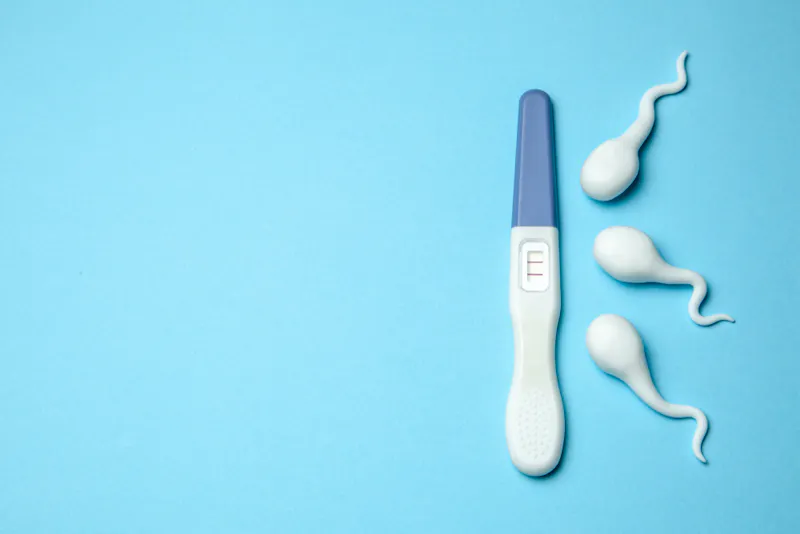Male fertility: tips for improving conception
What's covered?



If you and your partner are planning a family, you might have thought about your fertility and how healthy your sperm is. Understand the factors that can affect your fertility — and what you can do to improve it.
What makes sperm healthy?
For conception to happen, there needs to be sperm. But what guarantees healthy sperm?
Sperm health depends on 3 factors:
1. Quality
If ejaculation happens, there is most likely sperm, as a single ejaculation contains at least 15 million sperm a millilitre. When there’s little to no ejaculation, there are fewer sperm cells to fertilise an egg.
2. Movement
Sperm must move towards the egg through the woman's cervix, uterus, and fallopian tubes. You’re likely to be fertile if at least 40% of your sperm are moving.
3. Structure
The structure of the sperm cells aids movement. A normal sperm cell has an oval-shaped head and a long tail, making them move toward the egg.
What causes male fertility problems?
You could have a harder time conceiving if the quality, movement, and structure of your sperm are impacted. Here are some other factors which can affect sperm and cause male fertility problems.
Low sperm count (oligozoospermia), which can be caused by
- dilated veins in the scrotum (varicocele)
- some health problems — like diabetes, liver disease, and kidney disease
- imbalances in hormones like thyroid and testosterone
- sexually transmitted infections (STIs) and viral infections like mumps
- a genetic condition like Klinefelter syndrome — you’re born with an extra X chromosome
- undescended testes as a baby — testicles aren't in their usual place in the scrotum
- being overweight or obese
Problems with the delivery of sperm because of
- premature ejaculation — ejaculating too quickly during sex
- erectile dysfunction — finding it difficult to get and keep an erection
- damage or injury to reproductive organs
- previous urological or abdominal surgery
Overexposure to certain medications and lifestyle factors like
- alcohol
- cigarette smoking and recreational drugs
- certain medicines to treat depression, high blood pressure, and infections
- frequent heat exposure
- exposure to radiation or heavy metals
Testosterone levels and male fertility
Testosterone is a male hormone (androgen) responsible for the development of:
- muscles
- bones
- penis
- prostate
Testosterone is responsible for sexual function and essential for sperm production.
But, low testosterone isn’t the only cause of male infertility. Sperm production is also stimulated by hormones other than testosterone — like follicle-stimulating hormone (FSH). Even men with low testosterone levels can produce enough sperm, as concentrations are higher in the testicles compared to the blood.
Low testosterone might affect your sex drive, which can play a role in conception. You can check your testosterone levels as part of our men’s health blood test.
What can increase male fertility?
There are a couple of things you can do to help improve your fertility and increase sperm count.
Eat a healthy, balanced diet
Foods like fruits, vegetables, whole grains and fish are linked to better semen quality.
Some studies suggest that a portion of walnuts a day can improve the movement and strength of your sperm.
By ensuring optimal vitamin levels, you also fight oxidative stress, which might affect your sperm count.
Maintain a healthy weight
Lose weight if you’re overweight or obese. Moderate exercise (30 minutes on most days of the week) could also be good for fertility.
Manage stress
Studies have shown that physical or emotional stress might affect fertility. Manage stress by making time for family and hobbies, practising deep breathing, and consciously relaxing your muscles.
Reduce and preferably eliminate alcohol
Drinking too much can affect normal sperm. Don’t drink more than 14 units of alcohol a week. Try to consume less by having alcohol-free days each week, and give it up completely if you can.
Quit smoking and the use of recreational drugs
Cigarette smoking is linked to lower sperm count and weakens sperm movement. Smoking can also lead to more oxidative stress. Anabolic steroids, cocaine, and marijuana can also affect sperm production and quality.
Avoid excessive heat
Sperm quality is best when your testicles are cooler than your body temperature. Regulate this by avoiding laptops overheating on your lap and long periods in hot tubs or baths.
While there’s no scientific evidence, tight-fitting underwear could worsen dilated veins and swelling in the area. Stick to looser underwear.
How to check male fertility
If you’re struggling to conceive and concerned about your fertility, you can do a couple of things to check your fertility.
You should see a GP if you haven’t been able to conceive after 1 year of trying. Your GP will arrange a semen analysis to test for sperm count.
How to treat male infertility
If you’re still struggling to conceive after trying, you have the following options:
In vitro fertilisation (IVF)
You can consider IVF if you have a low sperm count and have been trying to conceive naturally for 2 years. This is where an egg is removed from the woman’s ovaries, fertilised with sperm and returned to the womb to grow.
Intracytoplasmic sperm injection (ICSI)
ICSI is an IVF technique where a single sperm is injected directly into an egg, and the egg is then transferred back into the womb to grow.
Hormone medication
If you have low levels of hormones that help develop sperm (also known as gonadotrophin hormones), gonadotrophin medicine could be used to improve your fertility. But the leading cause of a low sperm count will first be addressed before using a hormone-based medicine.
Donor insemination
If you’re unable to produce sperm at all, sperm from another man is used to inseminate the egg.
Benatta, M., Kettache, R., Buchholz, N., & Trinchieri, A. (2020). The impact of nutrition and lifestyle on male fertility. Archivio Italiano Di Urologia E Andrologia, 92(2). https://doi.org/10.4081/aiua.2020.2.121
Dohle, G.R., Smit, M. & Weber, R.F.A. Androgens and male fertility. World J Urol 21, 341–345 (2003). https://doi.org/10.1007/s00345-003-0365-9 (URL: https://link.springer.com/article/10.1007/s00345-003-0365-9 )
Ilacqua, A., Izzo, G., Emerenziani, G.P. et al. Lifestyle and fertility: the influence of stress and quality of life on male fertility. Reprod Biol Endocrinol 16, 115 (2018). https://doi.org/10.1186/s12958-018-0436-9
National Health Services (2019). Low sperm count. Retrieved 13 May 2022 from